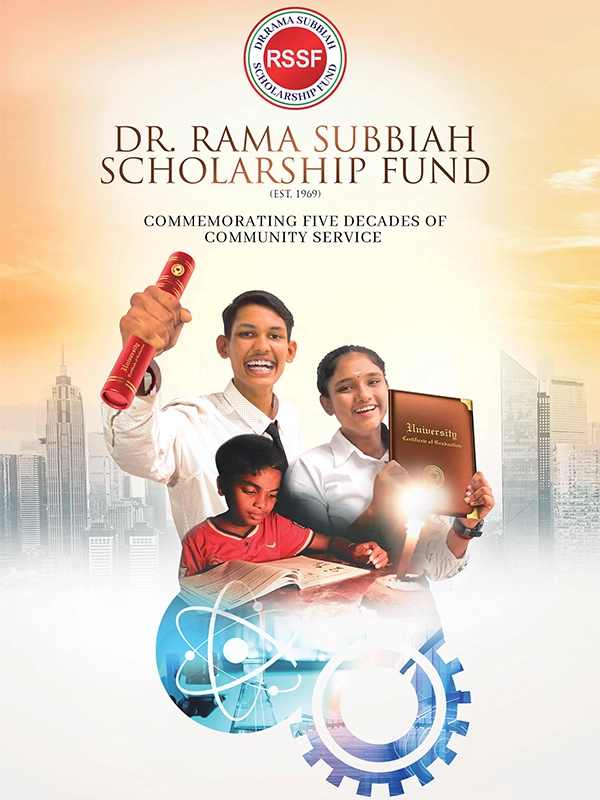About DRSSF
Dr. Rama Subbiah Scholarship Fund

“A group of like-minded UM [Universiti Malaya] graduates were already contributing RM5 monthly to help some needy students. Dr Rama wanted to formalise their efforts and register the fund.
“As a budding lawyer then, I was asked to draw up the constitution, which still exists,” recalls retired lawyer Datuk VL Kandan, 86.
Thanks to the fund, which was formalised in 1969 and later renamed the Rama Subbiah Scholarship Fund (RSSF), more than 2,000 students have since been able to complete their education.
Kandan, who is RSSF’s current chairman says: “The fund has exceeded our initial expectations and today, we offer scholarships for deserving secondary school students and undergraduates. But they have to return the amount given once they start working to keep the fund revolving.”
Buddies with a passion
History began like this.
Four young men met while studying at the Faculty of Arts at the University of Malaya (as it was known when it was located in Singapore) Rama, S. Singaravelu, R. Balakrishnan, and K. Pathmanaban. They became fast friends. Rama and Singaravelu were born in India but came to Malaysia at an early age, while Balakrishnan and Pathmanaban were local estate boys.
All four shared a passion for the Tamil language and graduated with first class honours. Rama was immediately recruited as a lecturer and tutor in the Indian Studies Department at UM, which by then had relocated to Kuala Lumpur; Singaravelu joined him in academia later.
Both eventually completed their doctorates and Rama became the first Malaysian to be appointed head of UM’s Indian Studies Department at a young age of 35, taking over from Prof. Xavier Thaninayagam, an expatriate from Sri Lanka. Rama travelled all over Malaysia, especially to plantation sectors, to encourage eligible students to study the Tamil language at UM. He knew education was the only way to lift marginalised communities out of poverty.
Kandan shares: “During one of his lectures, Dr. Rama spotted a student dozing off. Asked why, the student replied he hadn’t eaten for three days because he couldn’t afford to purchase food. The money he had went towards paying university fees and accommodation.
“Immediately, the kind lecturer whipped out RM50 and gave it to the boy to buy food.”
However, the incident played at the back of his mind and disturbed Rama who realised not many Indian students had the opportunity to study, and those who gained university admission didn’t have funds to attend. He told his three good friends about it and they all agreed to contribute RM5 a month to ensure other students did not suffer the same plight.
That was the genesis of RSSF.
Source: The Star - Read full article
